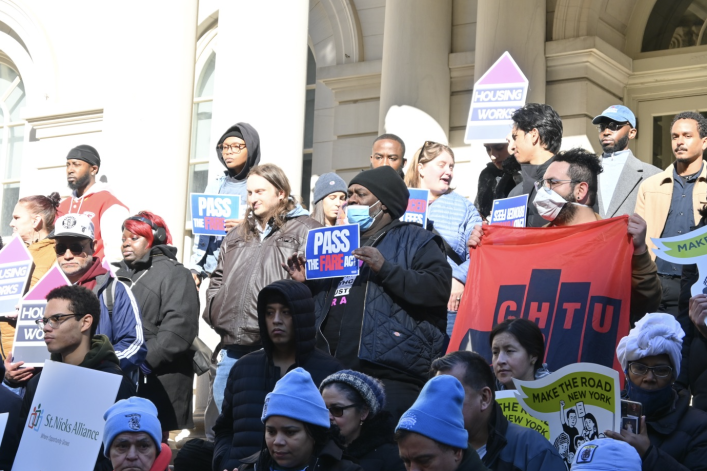REBNY sues to block new NYC broker fee law
- The FARE Act automatically became a law on Friday after Mayor Adams declined to sign it
- REBNY argues the broker fee law violates agents' free speech and contract rights

Supporters of the FARE Act gather at a rally at the steps of City Hall before the Nov. 13th vote, where the act passed with 42 council members in favor.
Celia Young/Brick Underground
New York City’s powerful real estate trade association filed a lawsuit on Monday to block the FARE Act from taking effect in mid-June.
Just days after the Fairness in Apartment Rental Expenses Act became a law, the Real Estate Board of New York sued in Manhattan federal court to block it. The FARE Act automatically entered into law on Dec. 14th after Mayor Eric Adams declined to sign it within a 30-day window.
The new law, introduced by City Council member Chi Ossé, requires that a landlord who hires a broker to market an apartment pay their fee, or risk facing civil penalties of up to $2,000. It also charges the Department of Consumer and Worker Protection with informing New Yorkers about the FARE Act through a public outreach campaign.
Traditionally, NYC renters have coughed up broker fees of 10 to 15 percent of their annual rent, even if the landlord hired the broker. Some brokers have charged even higher fees on rent-stabilized units, which represent some of NYC's most affordable apartments.
The FARE Act flew through the City Council and passed with a veto-proof majority of 42 members in favor on Nov. 13th. But REBNY mounted significant opposition to the act, and vowed to fight the legislation when it passed in November. On Monday, REBNY kicked that fight into high gear.
"The FARE Act is bad policy and bad law,” said REBNY’s general counsel Carl Hum in a statement. “This legislation will not only raise rents and make it harder for tenants to find housing but it also infringes upon constitutional guarantees of free speech and contract rights, as well as New York State law. We look forward to our day in court."
The battle continues
The lawsuit argues that the FARE Act violates brokers’ first amendment right to publish an open listing—where multiple agents market an apartment—on rental platforms such as RentHop, according to court documents. (StreetEasy already bans these types of posts.)
REBNY further argues that the FARE Act violates the contracts clause of the U.S. constitution because it prevents brokers from entering into a contract with a landlord to advertise their apartment, and then “seek compensation from the tenant.”
That’s exactly what Ossé wanted to prevent, he said in a statement Monday. (As Gothamist noted, NYC is an anomaly when it comes to this practice; in most other major U.S. cities, the person that hires the broker pays for their services.)
“This lawsuit is a last desperate attempt by the real estate lobby to undermine the voices of city residents and maintain an irrational practice that nearly every other big city in the country does not allow,” Ossé said.
Lastly, the lawsuit argues that it should be the state, not the city, to regulate brokers and their fees. (The New York Department of State’s Division of Licensing Services handles complaints against brokers and regulates real estate agents.)
The Monday suit is not the first time REBNY has sued to block changes to how broker fees are regulated. The organization successfully overturned the Department of State’s decision in 2020 to eliminate broker fees, based on the department’s interpretation of the 2019 rent reforms.
How the FARE Act came to be
Ossé first introduced the FARE Act in 2023, but it faced significant opposition from REBNY and failed to come to a vote. He reintroduced the act in 2024 and took to social media to push it, gaining support from local celebrities.
But an explosive hearing in June demonstrated that not everyone supported the FARE Act. Brokers argued that landlords would include the cost of a fee in a tenant’s rent, resulting in higher rents overall. But a report from StreetEasy found that the act is unlikely to push up rents.
A StreetEasy analysis of rental data from January 2012 to October 2024 found that properties that stopped charging tenants a broker fee “did not increase asking rents beyond broader market trends.”
The bill finally passed in November and became law on Dec. 14th, after Adams, who had previously raised concerns about the act raising rents, declined to sign it within a 30-day period, enabling the act to automatically become a law.
Ossé celebrated its passage in a statement Friday, saying, “the era of the captive tenant may finally be over.” Given the lawsuit, it seems like “may” was the right choice of words.































